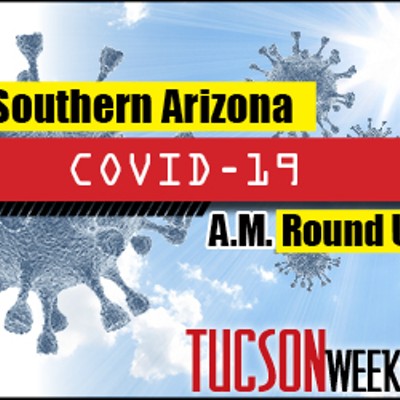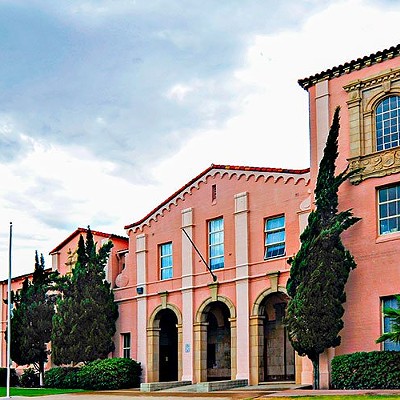The image of longtime Chicano-rights activist Guadalupe Castillo balancing herself with a cane in each hand while surrounded by Tucson police officers in riot gear at the May 3 Tucson Unified School District board meeting is difficult to forget.
That meeting came one week after students prevented a governing-board meeting from occuring by taking over the dais and chaining themselves to chairs. The May 3 meeting was attended by numerous community activists and supporters of Mexican-American studies in reaction to a resolution proposed by board member Mark Stegeman to change some of the Chicano-studies classes from requirement-fulfilling classes to electives.
Critics of TUSD Superintendent John Pedicone called for his resignation after that meeting. However, Pedicone will complete his first year on the job next month. The Tucson Weekly recently talked with Pedicone about his first year.
Mark Stegeman mentioned a regret in the Rincon and Palo Verde high schools' turnaround process that led to the firing of more than 100 teachers, because many teachers were reassigned rather than actually being fired. Do you agree?
I think what he was reacting to was the law. There's nothing we can do about the law regarding the (reductions in force). It's the policy in the district as well as Arizona state law. We can't simply say to a person who's lost their job that "you're gone from the district, and we're firing you, and you can't come back in." So what happened was that every teacher who didn't make the cut at either school then went into the regular hiring cycle ... and 46 percent, I think, were hired back at one of the schools, and another 44 to 46 percent at the other school. Then ... the majority of (the rest) were picked up by other (schools), because many of them were not necessarily poor teachers; they were just poor for that environment. ... If you walk on to those two campuses now and talk to kids and parents, they will tell you it's a much different environment and much more positive.
Some activists have said that you've yet to address what really took place regarding the police presence at the May 3 meeting.
I've said it (before), and I thought that we were pretty clear. ... As I said to the Mexican-American studies community advisory board, I'm not throwing (Tucson Police Chief Roberto) Villaseñor under the bus. I'm not doing it because I'm going to tell you the truth: The truth of the matter was that we had received word that people were making threats against our kids, and they were pretty serious threats. ... I don't know if we contacted the police or if they contacted us first. ... It might have been us that started it, because we said, "We got these threats," and they said, "We got the same threats."
At one point, the meeting venue and date were changed.
The date was going to be ... Cinco de Mayo, which was not a good day to have this meeting. ... Both school safety and the police agreed at that meeting that having it in a large venue, they could not protect the students and public. ... (Police) couldn't control exits ... We discussed those threats and ... police were saying to us, "We need to be there; now it's become a police matter."
This is what you're getting at: Who's in charge that night? So here's what the police suggested: "... Somebody has to be in charge of saying that they think there's a problem, and that person has to give a signal, and the police look when the signal's given, meaning that it's either dangerous or it's leading to a lack of control; then the police come in, and they will remove whoever it is."
So here's how that worked: There's a police officer directly across from me. Mark (Stegeman) is the president and is going to look at the person who is speaking. What happened that night is that once the public comments were over, if you remember, Lupe got up there, and she did the speech; that was orchestrated, and people knew that. We should have had conversations with (the community) and said, "What are you going to do, and then how do we arrange this so we are working together on this if there need to be statements made?"
What happened is that you looked like you were interested in arresting old ladies exercising free speech.
Well, yeah. So what happens then is the cop across the way from me, I'm going to give him the signal after Mark looks and says, "I want you to stop. Public comments are over." He says it again, "I need you to stop." When I hear him say that, I say, "I want you to leave now." That's the signal for the police officer ... to come over and remove the person. Well, interestingly, because of that building—and I thought that they had tested it—their radios didn't work very well. ... The signal was given by Mark and then by me, because that's the way we had decided. ... The way she was removed was not rough; it was with respect. ... If that were to happen again ... I would just suggest that we call a recess and not do those things, because you're right: It became a public issue, and it makes it look like we're doing something we had no intention of doing. Our intention was to keep the place under control and safe.
I've heard you went to the (UA) College of Education to develop a multicultural curriculum. Is this a step in dismantling Mexican-American studies?
No, it's not. When I look at the data and the statistics on how many kids leave us—either fail or drop out prior to when these (Mexican-American studies) classes are offered in high school, it's no secret: We lose about 700 to 800 Hispanic kids between freshman and sophomore year, and about the same number between sophomore and junior year. I told the Mexican-American studies (community advisory) group, "You're going to make an argument that we're trying to replace Mexican-American studies ... and that's not what's happening." I asked (the College of Education for) help, because what I would like to do is have something that when the students enter the district, they begin to get an understanding of the importance of differences, and maybe we can change these numbers around. We'll (offer these kinds of classes) at the elementary level until we get to middle school.













